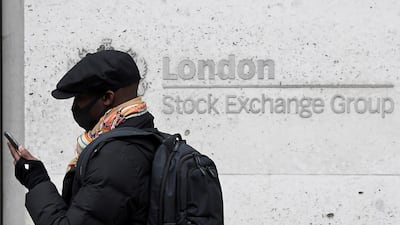The London Stock Exchange Group on Friday raised its full-year dividend for 2020 by 7 per cent after it posted an upbeat outlook and vowed to strike a balance between home and office working.
Despite the challenges posed by the coronavirus pandemic, the group said adjusted operating profit stood at £1.1 billion ($1.51bn) last year, a 5 per cent increase over the 2019 figure of £1.06bn, while total revenue rose from £2.06bn to £2.1bn.
The company proposed a final dividend of 51.7 pence a share to take the full-year payout to £0.75 per share, an increase of 7 per cent.
LSEG chief executive David Schwimmer said despite Covid-19 forcing the “vast majority of employees” to work remotely, the group delivered “a strong financial performance”.
He said the company was looking to strike a balance between home and office working as England eases out of its third lockdown.
“At the appropriate time, we hope to return our employees to the office,” said Mr Schwimmer. “Having said that, we will have more flexibility going forward.”
He was speaking two days after UK Chancellor Rishi Sunak backed plans to overhaul listings in a post-Brexit shake-up.
An independent review, unveiled by Mr Sunak alongside the budget, recommended updating rules around free float requirements, dual-class structures and special purpose acquisition companies, or Spacs, to strengthen the UK's position as a world-leading financial centre.
The news prompted British food delivery start-up Deliveroo to pick London for its listing because the review proposed allowing dual-share class structures in the LSE premium-listing segment.
This paves the way for founders to retain control over their companies by giving them deciding votes on key decisions, such as corporate takeovers.
Deliveroo said its "potential future float" would "adopt a time-limited, dual-class share structure" to provide co-founder and chief executive Will Shu "with the stability to take decisions to enable the company to execute on its long-term strategic vision".
"The government is keen to make the UK stock market home to more tech businesses and LSEG will be at the middle of this overhaul," said Adam Vettese, an analyst at multi-asset investment platform eToro.
"The UK government post-Brexit wants to portray its markets as open and innovative, as any major listing player will receive the lion’s share of incoming offerings."

Mr Schwimmer welcomed the proposals set out in the review of London’s listings rules, saying the recommendations, including those on Spacs, should be adopted quickly to help London maintain its prime position.
“No question, London remains one of world’s leading financial capitals,” he said.
However, he issued a warning that the US market for Spacs could yield poor return for investors.
Spacs were among the most prolific participants in Wall Street’s initial public offering market last year, with more than 200 blank-cheque companies raising more than $80bn.
Spacs are typically created by a sponsor, usually well-known executives, private equity or venture capitalists to raise money for yet-to-be identified future investments. If no targets are found within two years, the blank-cheque company is dissolved and the cash is returned to investors.
In case of a takeover, shareholders can retain or redeem their holdings if they do not like the deal.
About 180 Spacs have been filed or priced this year in New York, but there is none on the LSE, according to data from Refinitiv. The rising number of listings in the US has raised concerns about inflated valuations.
“There is clearly some froth in the US market for Spacs,” said Mr Schwimmer. “Some of that could end poorly for some of either those opportunities or some of those investors.”
He said speculative cycles in markets were typical and Spacs did have a role to play in the capital market.
However, he it was important that investors use them “thoughtfully and carefully”.
The stock exchange completed its $27bn purchase of Refinitiv earlier this year, kicking off a new era where most of its revenue comes from data.
The combined company is a trading powerhouse across fixed income, currencies, equities and derivatives. It will generate about 70 per cent of revenue from data, up from the LSE’s current 40 per cent, Bloomberg said.
“Revenues are up and the completion of the Refinitiv buyout is a positive step for the listings business, as it can focus on providing quality data services to clients,” said Mr Vettese.
At a time when dividends have been under significant pressure, especially in the UK, LSEG’s 7 per cent dividend increase “is eye-catching”, he said, with its “confident outlook” also boding well for future progress.
Meanwhile, Mr Schwimmer said the post-Brexit movement of trading in EU securities to Europe “had no impact on our business” because it was something it had “anticipated for years”.
The group's clearing unit remains a critical element of the EU’s financial infrastructure, with EU politicians vocal in demanding that companies shift euro clearing out of London and into the 27-nation bloc.
Mr Schwimmer said he was confident London would remain a global financial centre, and that clearing volumes “continue to be very strong and, if anything, growing”.


